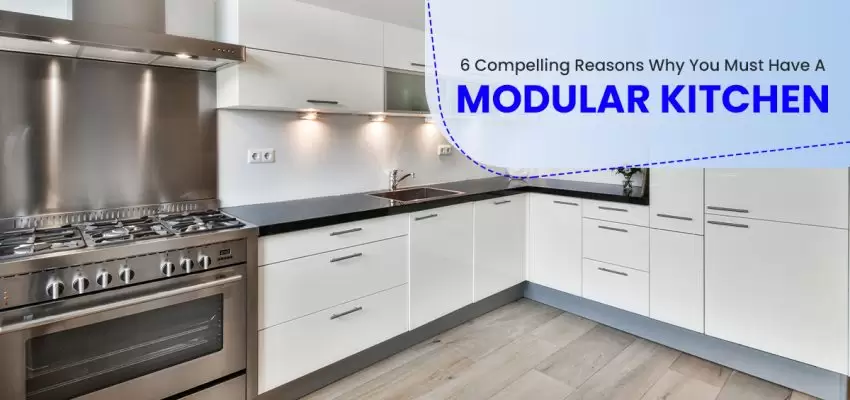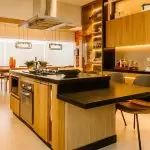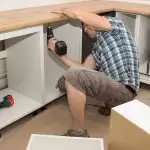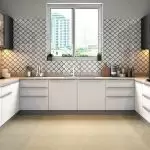The kitchen is the home’s central hub – where families gather, meals are prepared, and people converge. Given the kitchen’s importance for domestic functionality and bonding, transforming traditional kitchens into modular designs offers tremendous lifestyle benefits. Modular kitchens comprise standardized cabinets and fittings arranged in multiple configurations to enable customized and efficient kitchen layouts reflecting users’ priorities.
Post your Requirement
In this blog, we will first understand what constitutes modular kitchen designs. Next, we will explore the 6 most compelling benefits offered by modular kitchens over conventional kitchen layouts. We evaluate how modular kitchens enable enhanced convenience, flexibility, organization, technology integration, eco-friendliness and portability to perfectly match modern households’ needs.
Understanding Modular Kitchen Designs
Modular kitchens differ from traditional kitchens in their use of standardized, pre-fabricated modules and components rather than bespoke cabinetry built specifically for individual kitchens. These modules comprise base cabinets, wall cabinets, countertops, shelves, drawers, chimneys, appliances etc. Manufactured in standard sizes, they can be assembled in multiple ways using brackets, hinges and joints to create customized kitchen layouts suiting diverse spaces and requirements.
Homeowners can select modular components in varying materials like engineered wood, pressed laminates, acrylic and metal along with different finishes from catalogues. Modular kitchen suppliers then assemble and install these components as per tailored kitchen plans suiting each client’s cooking preferences, storage needs, aesthetic tastes, convenience factors and budgets. This inherent flexibility and customization make modular kitchens extremely popular design options.
6 Key Benefits of Modular Kitchens
Here are the 6 biggest benefits offered by modular kitchen designs over conventional kitchen layouts:
1. Ease Of Future Upgrades And Expansion
Modular kitchen components can be conveniently adapted, removed or added as requirements evolve. Additional storage units, shelves, chimneys etc. or new integrated appliances can be seamlessly incorporated into existing layouts to address growing families’ changing needs. Only modular kitchens can be repeatedly revamped to stay relevant amidst flexible domestic lifestyles.
2. Greater Organization And Storage Capacity
Modular kitchens solve key household pain points around clutter accumulation, haphazard equipment storage and misplaced cooking accessories through expert space planning. Specialized shelves, pull-out racks, hanging rails, vertical organizers etc. enable systematic storage that makes retrieval extremely convenient. Every utensil and ingredient gets allocated customized spaces as per usage frequencies. This organization boosts cooking speeds and domestic productivity while reducing chaos.
3. Integrated Smart Technology For Convenience
Smart connectivity is no longer a luxury but essential for households juggling busy schedules. Modular kitchens readily incorporate cutting-edge IoT gadgets, voice assistants, smart sensors and remote device controls to deliver intelligent automation. From Alexa-powered lighting adjustments to app-based smoke detectors, smart modular kitchens offer unmatched convenience benefits.
4. Sustainable And Eco-Friendly Construction
Environment-friendly construction practices are now mainstream priorities rather than niche choices. Modular kitchens cater to this growing preference by utilizing renewable materials like bamboo, recycled wood/plastic, energy-efficient appliances etc. Their manufacturing also minimizes construction site waste generation compared to in-situ brick-and-mortar constructions. Water-saving faucets and optimized drainage layouts make modular kitchens the greenest kitchen solutions.
5. Quick Assembly And Portability
Constructing traditional brick-and-mortar kitchens requires tremendous efforts in masonry, plastering and extensive waiting times for materials to dry before further applications. Modular designs featuring factory-finished cabinets mounted on supporting frames mitigate this complexity using quick-connect fittings, brackets and rails. Completed kitchens get operational within days rather than months. These accelerated kitchen upgrades benefit families avoiding prolonged disruptions.
6. Higher Resale Value Potential
Modular kitchens raise property valuation metrics significantly compared to conventional kitchen layouts. Their ergonomic functionality, efficient storage, durability and integrated appliances greatly entice prospective property buyers. Real estate surveys reveal that homes with well-designed modular kitchens draw 7-15% higher prices owing to perceptions around better lifestyle experiences. With evolving user priorities, modular kitchens boost asset value.
Conclusion
Modular kitchens offer multifaceted lifestyle enhancements spanning enhanced space utilization, storage capacity, future readiness, eco-compliance, convenience, faster setup times and real estate value growth compared to traditional kitchens. With families now spending considerably more time together in kitchens rather than just using them for cooking activities, upgrading kitchen designs using intelligent and customizable modular components has become essential. Seeking expert modular kitchen designers’ consultations will ensure homeowners’ unique preferences around storage, appliances, accessories, seating arrangements and aesthetic appeals manifest optimally within their modular kitchen visions. Investing in modular designs guarantees welcoming, functional domestic hubs supporting faster chore completion, more family interactions and memorable bonding experiences for years to come.
FAQs
Q-1. What are the key benefits of a modular kitchen?
A-1. Flexibility, customization, organization, technology integration, eco-friendliness, and enhanced home value through modular kitchen designs.
Q-2. How do modular kitchens enable future expansions?
A-2. Standardized modular components allow easy kitchen upgrades via adding/removing cabinets, and appliances without major remodeling.
Q-3. How do modular designs promote kitchen organization?
A-3. Through specialized storage solutions – shelves, racks, drawers fitting utensils, and appliances as per usage patterns and frequencies.























Post A Comment